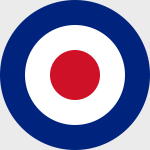Hobby Master HA7105 RAF Supermarine Spitfire Mk. XVIII Fighter - NH850/Z, No.60 Squadron, Kuala Lumpur, Malaya, Dec. 31st, 1950 (1:48 Scale)
"Never in the field of human conflict was so much owed by so many to so few."
- British Prime Minister Winston Churchill, commenting on the British airmen in the Battle of Britain
 The Spitfire is the most famous British aircraft of all time. Although less numerous than the Hawker Hurricane, it is remembered as the sleek, thoroughbred fighting machine that turned the tide during the Battle of Britain. The Spitfire was among the fastest and most maneuverable prop-driven fighters of World War II, serving in virtually every combat theater.
The Spitfire is the most famous British aircraft of all time. Although less numerous than the Hawker Hurricane, it is remembered as the sleek, thoroughbred fighting machine that turned the tide during the Battle of Britain. The Spitfire was among the fastest and most maneuverable prop-driven fighters of World War II, serving in virtually every combat theater.
Supermarine designer Reginald Mitchell created this small, graceful, elliptical-wing fighter with eight guns in the wings that were able to fire without being hindered by the propeller. The immortal Spitfire thus became not merely one of the best-performing fighters of all time, but also one of the best-looking. Although never employed as a long-range escort, the Spitfire was a champion in an air-to-air duel. Spitfires routinely dived at the speed of sound, faster than any of the German jets.
A carrier-based version, called the Seafire, was a winner in its own right, serving valiantly on convoy routes during World War II. The Seafire 47 was even used in the early stages of the Korean War, before it was replaced by more modern jet aircraft.
Pictured here is a 1:48 scale replica of a RAF Supermarine Spitfire Mk. XVIII fighter that was attached to No.60 Squadron, then deployed to Kuala Lumpur, Malaya, on December 31st, 1950.
Sold Out!
Dimensions:
Wingspan: 9-inches
Length: 7-1/2-inches
Release Date: October 2008
Historical Account: "I Strive Through Difficulties to the Sky" - Reformed at Lahore in India on April 1st, 1920, No. 60 Squadron, now equipped with de Havilland bombers, began an association with the Middle and Far East that was to last for 48 years. Between the wars, the unit found itself involved in many conflicts along the North West Frontier, flying Airco DH.9A and Westland Wapiti general-purpose aircraft until Bristol Blenheims arrived six months before the start of World War II. After moving to Burma (now called Myanmar) in February 1941, the Squadron suffered heavily at the hands of the advancing Japanese forces and was eventually declared non-operational and moved to India a year later.
During 1943, No.60 Squadron converted to Hawker Hurricane fighter-bombers, attacking targets in Burma until May 1945 when American-built Thunderbolt fighters arrived. Shortly after the Japanese surrender, the Squadron moved to Java and was soon in action against Indonesian rebels. A year later, No. 60 transferred to Singapore prior to converting to Supermarine Spitfire F18s and these were employed in attacks against Communist guerrillas in Malaya until the arrival of Vampires in late 1950 and then Venoms in 1955.





![Finnish Brewster Model 239 Buffalo Fighter - Jorma Karhunen, 3./Lentolaivue 24 (Lv.24), 1941 [With Collector Magazine] (1:72 Scale)](http://cdn4.volusion.store/qh9e9-jdqv9/v/vspfiles/photos/DAWF27-1.jpg?v-cache=1740197136)


